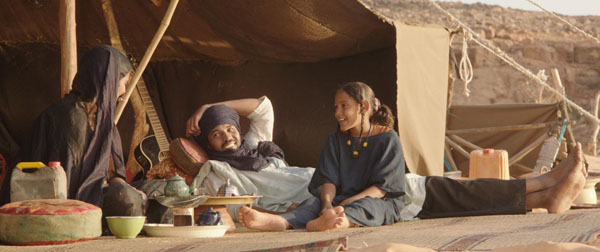Abderrahmane Sissako’s Timbuktu premiered in Cannes, screened in the Masters program in Toronto and will be presented this evening and tomorrow afternoon at the New York Film Festival. Writing for Cinema Scope, Tom Charity notes that “Sissako’s first feature since 2007’s Bamako is a fleet, forceful response to the brief but traumatic few months in 2013 when foreign jihadists seized control of the northern Malian city and imposed Sharia law (an incursion that was eventually repelled by the former colonial power, France, which is where Sissako now plies his trade). Not surprisingly, the film exhibits scant sympathy for the rebels, whose zealotry rides roughshod over Timbuktu’s traditionally moderate Islamism. Women are instructed to cover their heads and hide their hands. Music and soccer is banned. Men with big guns storm into the mosques heedless of the Imam’s protests. Much worse is to come.”
“As in Bamako, which depicted a mock trial with the International Monetary Fund and the World Bank as co-defendants, Sissako is trying to engage his target… dialectically, building an argument against armed fundamentalism using the language and traditions of Islam,” writes Ignatiy Vishnevetsky at the AV Club. “His central point—that the militants are unreasonable, capricious, and cruel—is hardly new, but it’s bolstered by the fact that he frames his argument using a community of religious Muslims.”
“Several local characters recur throughout the film, their dispersal—as if they were gliding through—providing momentum to a narrative that might be otherwise weighed down by so much inhuman ideological bastardization.” Howard Feinstein for Filmmaker: “With jihadists upholding The Law, the story moves in a particular direction, which the director manages to shape so that a morally reprehensible judgment is transformed into cinematic perfection. In this, as in other extreme long shots of violent acts, he is well served by DP Sofiane El Fani, who captures the desert’s peculiar emptiness all the way through with brilliant use of widescreen.”
“The jarring contrast between the residents and the occupiers prowling the area with flashlights and guns offers a tragic vision of a spartan desert paradise facing extinction,” writes Stephen Holden in the New York Times. More from Dustin Chang at Twitch.
Update, 10/2: At Artinfo, David D’Arcy points us to Jacques Follorou‘s March 2014 story in the Guardian reporting on the return of jihadists to northern Mali a year after the French had forced them out.
Update, 10/4: “God may never be a tangible force in this piercing, unrelenting film,” writes Chris Cabin in Slant, “but as Fatou (Fatoumata Diawara), a local musician, sings through her tears and above the cracking of a whip against her back, punishment for playing music in her own home, the true measure of real faith, in God as well as in man, is felt forcefully and seen with peerless clarity.”
Update, 10/12: “From the regionally and ethnically specific Tamasheq that a convicted man uses to communicate with one of his guards, to the colonial languages of French and English, the words spoken in the film reflect the city’s various histories of conquest,” notes Genevieve Yue at Reverse Shot. “This is also the condition of film’s actors, who were drawn from across Africa, Europe, and North America, with the lead couple, Ibrahim Ahmed and Toulou Kiki, playing Kidane and Satima, cast from a Tuareg refugee camp in Italy, and the resident chicken-wrangling madwoman played by the Haitian actress Kettly Noel. Like the lives of those they portray, many of the actors are globally displaced. Staying put, the film makes clear, is not an option.”
Update, 10/13: “Like last year’s A Touch of Sin, this vital movie offers a keyhole through which viewers can peer into an authentic dramatization of pressing global issues that goes way beyond mere news headlines,” writes Michael Smith. “What really elevates Timbuktu to the status of essential viewing, however, is the way Sissako brings to his story the point of view of poetry—most evident in a stunningly composed scene of conflict between the cattle farmer and a fisherman, and an exquisitely lovely montage sequence involving a soccer match played without a ball.”
Update, 12/27: Joshua Sperling talks with Sissako for the Brooklyn Rail.
Update, 1/10: “How do you film jihadists?” asks Elisabeth Lequeret in Film Comment. “Like characters in a Beckett play. Dislocated (a man tries to start his old car in the middle of the dunes). Incoherent (a young recruit pitifully stumbles through the text of a propaganda video). Stammering out a vague approximation of Arabic (henceforth, Songhai, the native tongue of Mali, will be regarded as an unholy language). What do we make of a language lost between authoritarian barking… and utter triviality? This contradiction gets to the very heart of the film’s characters.”
Update, 1/11: “Alongside Citizenfour, Timbutku might be the most urgently topical film of the year,” writes MoMA Curatorial Assistant Sophie Cavoulacos.
Update, 1/23: Interviews with Sissako: John Anderson (NYT) and Violet Lucca (Film Comment).
NYFF 2014 Index. For news and tips throughout the day every day, follow @KeyframeDaily. Get Keyframe Daily in your inbox by signing in at fandor.com/daily.




